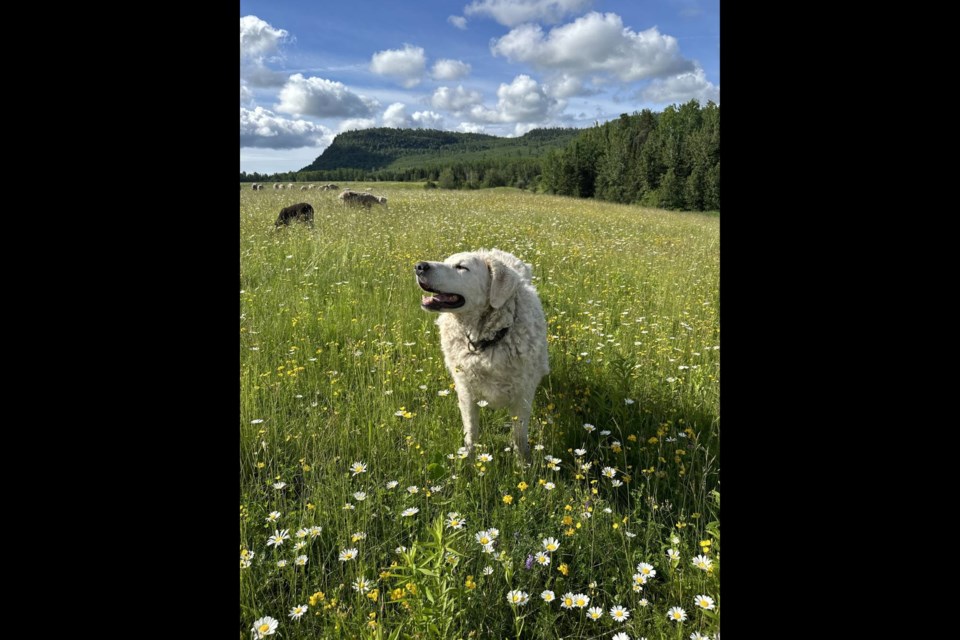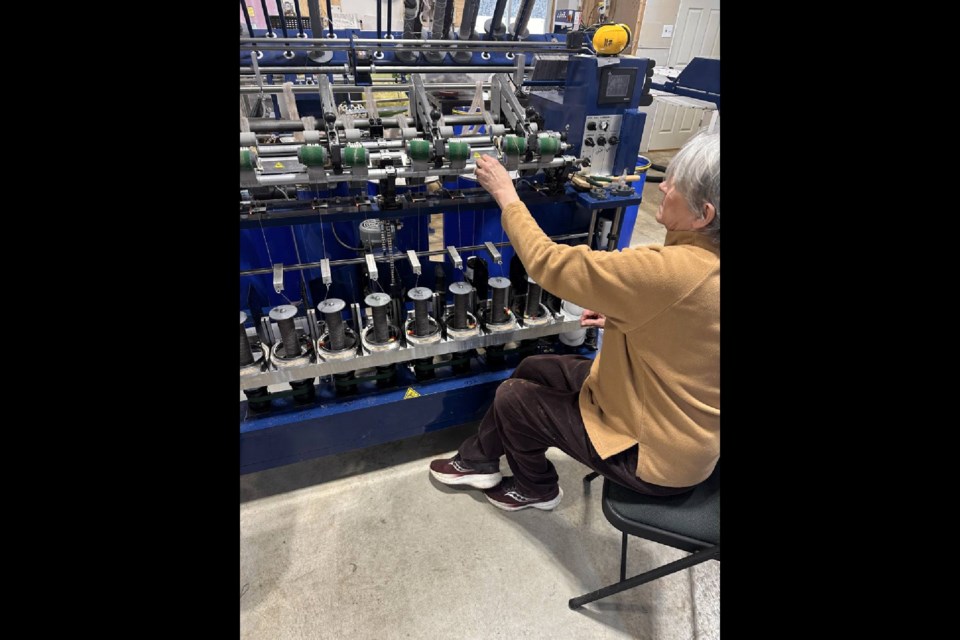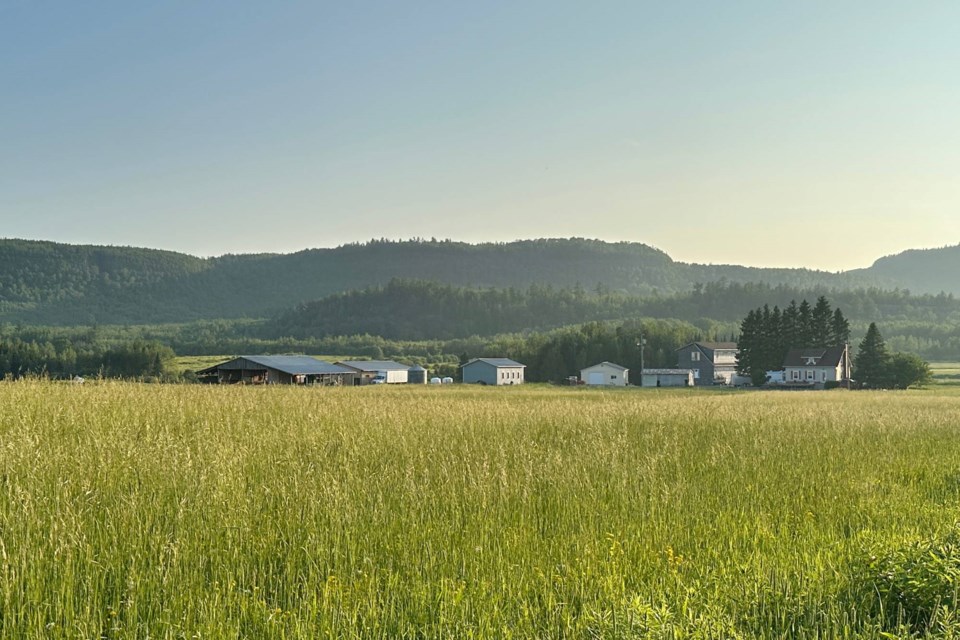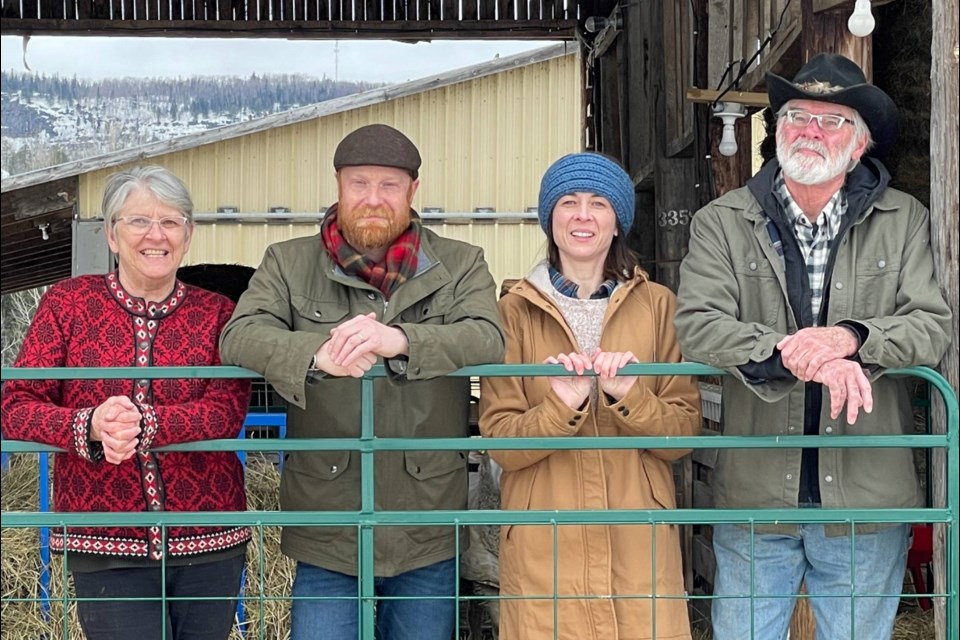NEEBING - There are no black sheep at the family-run Borderlands Farm in Neebing, Ont. Well, except for the black-and-white faced Gene Simmons, the only dark-coated example of the distinctive, crimpy-woolled Polypay breed in Borderlands’ 55-sheep flock.
The picturesque 150-acre, lamb, wool, and garlic farm located minutes from Thunder Bay is run by two generations that harmoniously pair a unified farming philosophy with a diversified and complementary skillset.
After purchasing the farm in 2017, Beverly and Bryan Barlow made the move to the vibrant Thunder Bay agricultural scene in 2019 from a chicken, lamb, and cattle farm in Haliburton.
Their daughter, Gwen Marsonet, and son-in-law, Brody Marsonet, moved from a smaller farm located in the community of Devlin outside Fort Frances in 2021.

Everyone helps out with daily chores and maintenance, but each family member has his or her own wheelhouse.
Brody takes care of mechanical repairs and working with farm equipment. Bryan has a financial background and handles the paperwork. Gwen is the social media, marketing, and sales guru.
And Beverly is a master spinner who manages the first wool mill in northwestern Ontario, created in 2023.
“We’ve all been able to play to our strengths, and to do it as a family, which I think is important,” said Gwen.
They decided to collaborate on Borderlands Farm in order to commit to high standards of quality food production and to make their vision of a truly holistic farm a reality.
At Borderlands, holistic farming means a complete commitment to sustainability, which includes everything from a no-waste policy, to environmental stewardship of their farmland, to collaborations with their local farming and artistic communities.
“It’s about sustainability in the fullest meaning of the word,” said Gwen. “We look at it in terms of social and business sustainability.”
The new wool mill perfectly fits into their philosophy. It fills a needed niche within the local community, allows for the processing of a sustainable product, and also provides a method of utilizing fibre that might otherwise go to waste.
On top of all that, the wool mill is also a passion project.
“[My mom] was pushing for sheep and pushing us in that direction, so a wool mill made sense,” said Gwen, explaining why the Borderlands crew decided to create the mill in 2023.
Beverly has over 20 years’ experience as a knitter, spinner, and weaver, including showing and judging fibre arts and textiles.
“You need to have that kind of background to understand this machinery,” said Gwen. “She knows so much about wool, she’s the ideal person to start up a wool mill. The yarn [she’s] producing is amazing.”

The creation of the wool mill was the next logical step in the evolution of Beverly’s journey with wool. Being able to process her own wool, said Gwen, had been Beverly’s dream for decades.
The farm store features yarn in a stunning autumnal palette of purples and oranges that would be any knitter’s dream. The yarn is on sale for the first time this year, after the store previously sold a gorgeous array of pink, green, blue, and red dyed rovings — unprocessed wool used by felters and hand-spinners.
“My mom is known for her dying skills,” Gwen said. “She blends the colours through multiple stages in the process. She uses other colours to bring out the main colours and that’s what makes our products unique.”
All wool is sold direct-to-customer via the Borderlands online Farm Store and the Thunder Bay Country Market. Customers can also buy meat, garlic, tallow soap, and dog treats.
So far this year, they’ve milled and dyed about 50 pounds of their own wool. They’ve also milled orders for local farmers consisting of anywhere from two pounds to 42 pounds of raw wool.
For Borderlands, one of the most rewarding parts of knitting together northwestern Ontario sheep farmers is being able to give farmers an avenue for getting more value out of their animals.
Local customers also appreciate Beverly’s passionate love of the art form. They often ask for help on their own knitting or fibre arts projects in person at the market, which Beverly regularly attends to offer workshops.
For the future, Gwen and her family hope to continue to expand the wool mill aspect of the business without compromising their high standards.
“We want to grow, but we’re being super fussy about how we grow,” said Gwen. “We’re really making sure we’re creating the healthiest flock we can. …I want to see an animal that looks really good, that looks like their body condition is ideal.”

In terms of growing their customer base, Gwen believes transparency and visibility are important to discerning customers who want to know the facts behind their food and fibre products.
She considers the farm’s social media presence to be a “farm journal,” an organic part of showing customers how invested they are in what Borderlands is creating.
“I’ve put down all the information I would want to know,” said Gwen. “I want to be as up front with people as possible.... You want your customer to make a fully informed choice and understand what they’re getting with the product.”
They’re also constantly looking for new and better ways to honour their commitment to holistic sustainability, which is why they have recently expanded their sales into tallow soaps.
Gwen got the idea to process tallow, a meat byproduct, from a customer at the market, who taught her how to render soap. Their natural recipe, which has no artificial dyes or ingredients, includes coconut oil and castor oil.
Borderlands also works with other local artists such as Early Snows Pottery, which creates garlic and soap dishes, and North of 48 Custom Woodworking, which makes spindles and roving bumps for hand-spinners.
A felting kit designed by local needle felting artist Marlo Currie allows customers to make an adorable Polypay sheep of their own.
“As we grow, we’re always listening to what our customers are asking,” said Gwen. “It’s exciting. That’s the cool thing about the market, and it’s a great way to be connected and responsive to our customers.”



